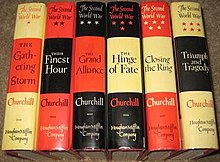The Second World War (book series)

First edition in 6 volumes
|
|
| Author | Winston Churchill and assistants |
|---|---|
| Country | United Kingdom |
| Language | English |
| Subject | Second World War |
| Publisher | HoughtonMifflin |
|
Publication date
|
1948–1953 |
| Awards | 1953 Nobel Prize in Literature |
The Second World War is a history of the period from the end of the First World War to July 1945, written by Winston Churchill. It was largely responsible for his being awarded the Nobel Prize for Literature in 1953. Churchill labelled the "moral of the work" as follows: "In War: Resolution, In Defeat: Defiance, In Victory: Magnanimity, In Peace: Goodwill".
Churchill wrote the book, with a team of assistants, using both his own notes and privileged access to official documents while still working as a politician; the text was vetted by the Cabinet Secretary. Churchill was largely fair in his treatment, but wrote the history from his personal point of view. He was unable to reveal all the facts, as some, such as the use of Ultra electronic intelligence, had to remain secret. From a historical point of view the book is therefore an incomplete memoir by a leading participant in the direction of the war.
The book was a major commercial success in Britain and the United States. The first edition appeared in six volumes; later editions appeared in twelve and four volumes, and there is also a single-volume abridged version.
When Churchill assumed office in 1940, he intended to write a history of the war then beginning. He said several times: "I will leave judgements on this matter to history – but I will be one of the historians." To circumvent the rules against the use of official documents, he took the precaution throughout the war of having a weekly summary of correspondence, minutes, memoranda and other documents printed in galleys and headed "Prime Minister's personal minutes". These were then stored at his home and Churchill wrote or dictated letters and memoranda with the intention of placing his views on the record, for later use as a historian. The arrangements became a source of controversy when The Second World War began appearing in 1948. Churchill was a politician not an academic historian and was Leader of the Opposition, intending to return to office, so Churchill's access to Cabinet, military and diplomatic records denied to other historians was questioned.
It was not known at the time that Churchill had done a deal with Clement Attlee and Labour government which came to office in 1945. Attlee agreed to allow Churchill's research assistants access to all documents, provided that no official secrets were revealed, the documents were not used for party political purposes and the typescript was vetted by the Cabinet Secretary, Sir Norman Brook. Brook took a close interest in the books and rewrote some sections to ensure that British interests were not harmed or the government embarrassed. Churchill's privileged access to documents and his knowledge gave him an advantage over other historians of the Second World War for many years. The books had enormous sales in both Britain and the United States and made Churchill a rich man for the first time. While Churchill's name appears on the books as the author, much of the series was gathered by a team of researchers.
...
Wikipedia
